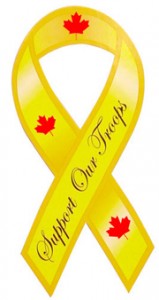First Hero Fund scholarship awarded
Scholarship for children of fallen Canadian soldiers is granted despite professors’ objections last March
Share
(Editor’s note: This post has been updated below)
Hang on to your knickers, University of Regina professors. The first Hero Fund scholarship has been awarded.
Maritimer Matthew Mellish is the first recipient of the Hero Fund scholarship for children of fallen Canadian soldiers. Matthew’s father, Warrant Officer Frank Mellish, was killed in 2006 by Taliban insurgents in Afghanistan. Matthew has received $10,000 from the Canadian Hero Fund to cover tuition and books.
A nice break for a young student who has obviously had a rough ride, right?
Wrong, you imperial jingoist!
When a similar initiative, dubbed “Project Hero,” was being launched earlier in the spring and universities across Canada were signing on, a group of professors from the University of Regina released an “open letter” to the president of the university objecting to its participation in the scholarship program.
They wrote that the Hero Fund (Update: We have been informed by Hero Fund administration that they are unaffiliated with Project Hero. The Hero Fund relies strictly on private donations, whereas individual universities foot the bill for Project Hero recipients.) Project Hero was “a glorification of Canadian imperialism in Afghanistan and elsewhere.”
“We do not want our university associated with the political impulse to unquestioning glorification of military action,” they argued.
Though despite the professors’ valiant (dare I say, heroic?) efforts to get the university to ditch the program, the University of Regina is still participating in the Project Hero scholarship. And now the Hero Fund has awarded its first scholarship. Bloody compatriots! Surely an extended appeal to Matthew Mellish directly is the next step in these professors’ pursuits of military modesty. Right? Or will bashfulness suddenly seize their pens when ideology is confronted with a real-life story?
Anti-war movements on campus are not new. Poppies have become the target of late, quickly becoming an unfashionable statement on many Canadian campuses. Some students and professors choose to abstain from wearing the Remembrance Day symbol because they believe it glorifies war. Others opt to wear white poppies, which is seen as a symbol for peace and nonviolence.
Then there are more direct approaches; in 2007, for example, the University of Victoria’s student union banned military recruiting at the campus job fair, a move which was later overturned by a general vote. At Laurier that same year, students chose to protest across the street from a veterans’ memorial, only after conceding to pressure and abandoning their original plan to protest on the memorial during ceremonies.
This sort of in-your-face pacifism is what leaves as bad taste in some people’s mouths. Choosing not to wear a poppy on Rememberance Day is a personal choice–lighting a torch to the stash is not. The University of Regina professors can exclude the word “hero” from their own military vernacular if they so desire, but no one asked them to serve as university administration conscience. They have the option to keep their change in the pockets, and the decorum–hopefully now–to cease the politicization of a student’s personal tragedy.
